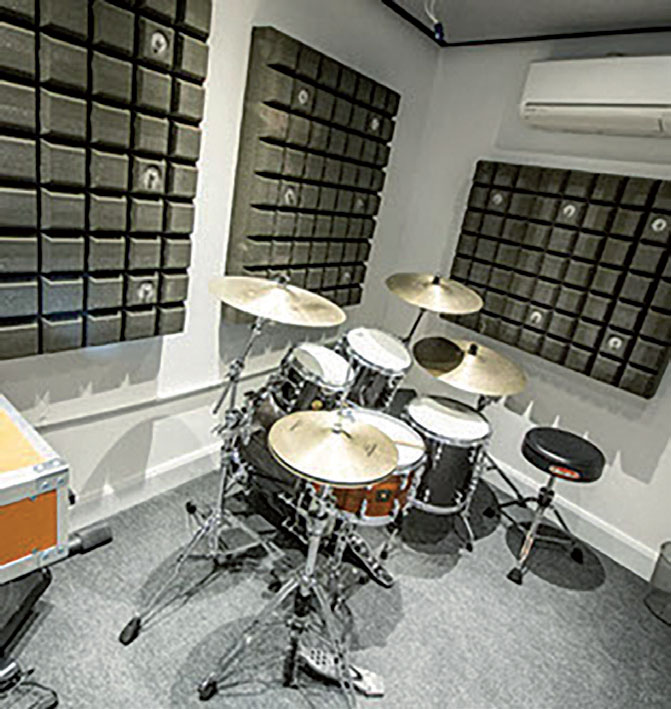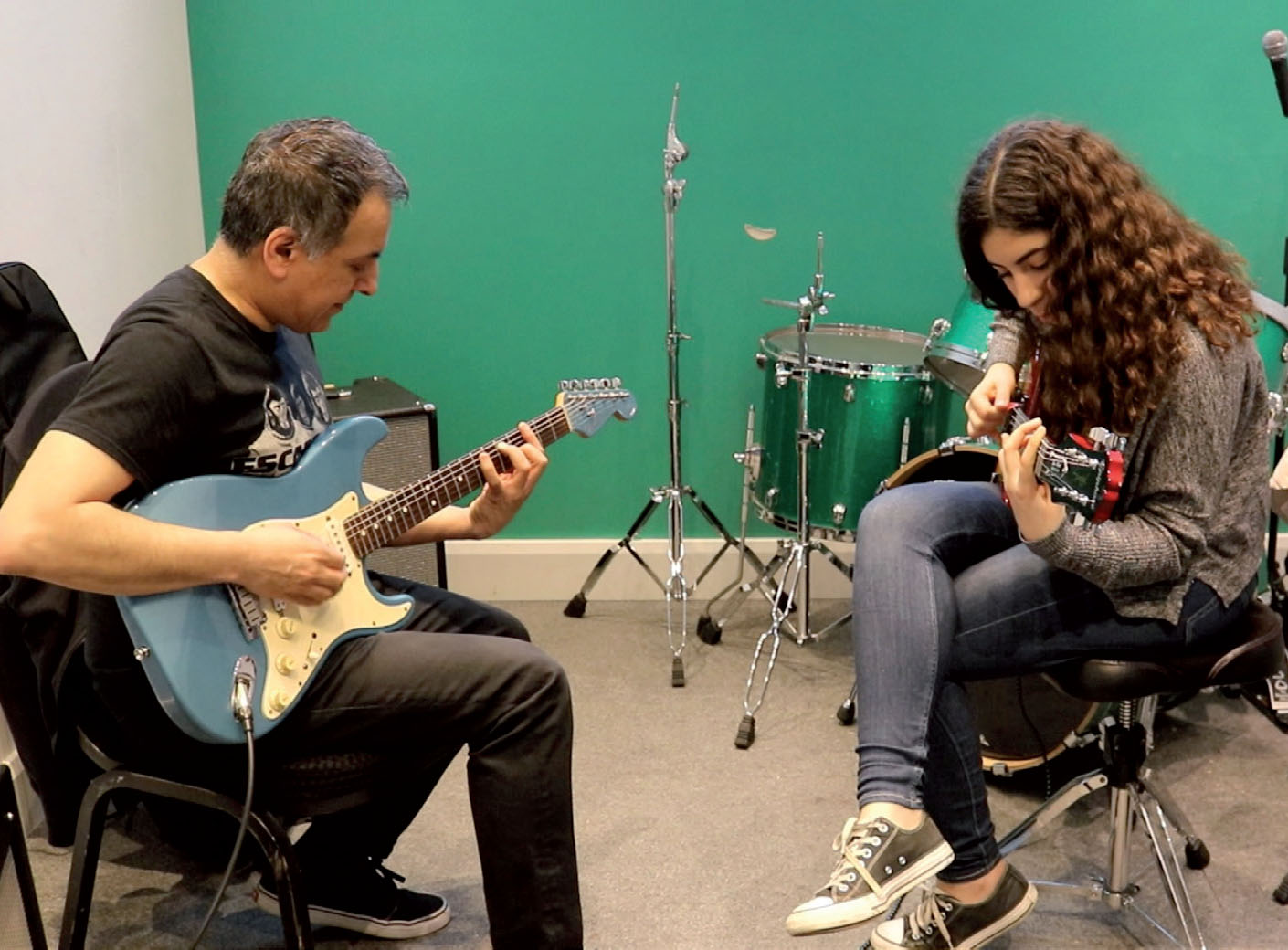
If you embark on a quick, winding walk from Acton Town station, you'll find several sizeable industrial-looking buildings, including warehouses, studios and a car park. As you turn a corner, two vans come into view, parked outside two buildings with bright orange colour schemes. Taking a closer look, the trucks are not, perhaps, what you would expect. With a chic, bold black ‘b’ inscribed on the side of the vans, they read ‘Bell Music, London’. They are the property of Bell Music Academy and an important part of the incredibly new academy's history.
Bell Music started around 30 years ago as a percussion hire centre – hence the large vans – and it certainly thrived as such. Its instrument collection includes taiko drums from Star Wars, the haunting celeste from Harry Potter, and the gongs sounded in The Lord of the Rings. Musical visitors to Bell Music looking for recording spaces are equally impressive, from Gorillaz to Steve Gadd. The nine studio spaces at Bell Music are extremely well-equipped. The ‘Percussion Room’, for example, is home to a five-octave marimba, a set of five Premier Elite timpani, bongos and a gong bass drum, to name but a few, while the vast Red Room sometimes serves as an educational clinic hosting up to 75 people.
The successful percussion hire company was not, however, enough for Lauren Kosty, a vibrant and enthusiastic percussion teacher from Los Angeles [you can read her wrting on page 52]. Before coming to Bell Music, Kosty had already enjoyed a varied music career, performing orchestral, jazz and musical theatre, as well as film recordings. She has played alongside every kind of musical celebrity, from Puff Daddy to Gustavo Dudamel. Two years ago, Kosty began pushing to encourage people learn an instrument among the incredible equipment, and so the Bell Music Academy was born. Soon, students of all ages were attracted to the academy, presented with the choice of studying percussion, drums, singing, saxophone, keyboard, guitar and bass. The academy's youngest player is four years old, while the oldest is 76. ‘Our tagline is really that we take people of all ages and all abilities,’ she says.
Building up
Almost 40 students attend the academy, and it is continuing to grow. Perhaps the reason for the academy's success is its decision to accept people without a musical background or experience. The mantra appears to be, if you are willing to learn and want to succeed in becoming a musician, we are here to support you. ‘Our lessons are almost always one hour long,’ says Kosty. ‘In my experience, anything less and you can't really dig into the material. It's not magic – those who put in the most hours are more likely to succeed. That said, lessons are taken as and when they are possible – there's no pressure, we know people have other commitments, too.’ Fortunately, there is a lot of room for flexibility, with the academy being open six days a week, including several evenings.
Speaking with 14-year-old percussion student Lila Skeet, it quickly becomes clear why the academy is such a popular choice. ‘I love the range of instruments here. I have the opportunity to study and practice on a different instrument whenever I come,’ she says.
The lessons are structured entirely around what the student would like to focus on, unlike some more conventional learning courses. ‘I love that I can explore what I want in my musical education, rather than just using a book’, says Skeet.
Kosty, who is her teacher, adds: ‘I'm very into the idea of being able to see many different musical styles and approaches to playing music. Students come in here with one fixed idea and end up open to all genres. The same applies to teachers – I don't want teachers to be told what to teach. It's all about being equally guided by the student in that sense. Teachers are able to pick up on what excites them and capture their enthusiasm.’
This approach is also taken with exams, with students picking their own boards, if they even choose to do examinations. Skeet has learned piano with her mother, Karen Glen, and has passed Grade 8, but at Bell Music Academy, she says isn't in any rush to take an exam. Skeet is starting her GCSE studies and also does sport, dance, and school orchestra, where she is the sole percussionist.

Some of the Academy's facilities
‘I actually find coming to Bell Music Academy a relaxing experience every time’, she explains. Kosty aims to make the lessons as engaging and varied as possible: ‘Students know exactly what they want, they know themselves, and they tell me. It's that personal exploration and opinion which gives life to every lesson.’ While adapting to the student's own goals and expectations for the lesson, Kosty aims to make the lessons half auditory-focussed, half reading music. The combination has certainly proved successful for Skeet, who is already confident in transcribing music in her lessons.

Guitar tutor Mo (left) instructs Maya
‘Enthusiasm is infectious,’ Skeet tells me. ‘And I certainly get mine from my teacher.’ The lessons at the academy are given almost exclusively one-on-one, however, Kosty has plans to change this. ‘It's still early days for us. But I am certainly hoping to create a percussion ensemble for the students next year’.
Reaching out
There is also a strong sense of community, with all the teachers coming from nearby areas. The students are also almost exclusively local and several work at a nearby Chiswick-based business park, from which they can simply visit the academy for a lunchtime lesson.
Many individuals at the Bell Music Academy have also given back to both other students and to the community. One of the concerts arranged by the academy at Hammersmith's St Peter's Church saw a turnout of 175 people and included delights such as a percussion adaption of Carnival of the Animals, a vocal quartet, and a performance of the ‘Circle of Life’. The nearby Acton Garden Flats has gifted the Academy with grants to enable to concerts to take place. Other work by the academy includes outreach at schools by Kosty and her 15 teaching colleagues. ‘My hope is to make connections with the community here wherever possible,’ says Kosty. ‘There is actually a fair bit of public funding available thanks to the flats, so we hope to sort out some group classes for the local residents.’
‘The Bell Music Academy has a drastically different approach to music teaching than many music schools,’ adds Glen. It's hard to disagree – it's rare to find such a young yet successful institution which has already firmly established its teaching philosophy and which is so inclusive to anyone and everyone. It's easy to forget that the academy has only been open for a short period of time, as its heritage and the passion of its new members has created a musical hub which is likely to move from success to success.








